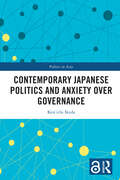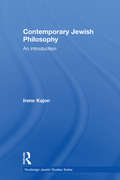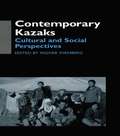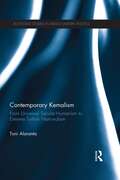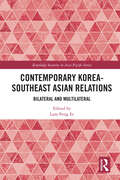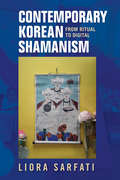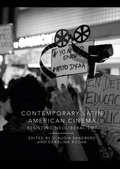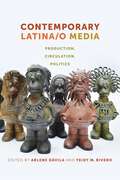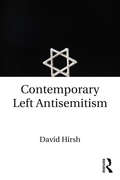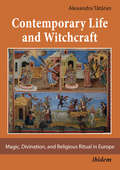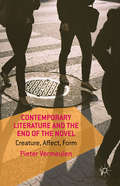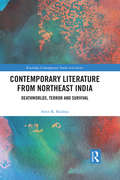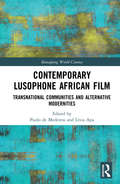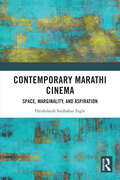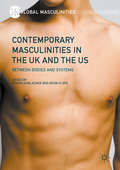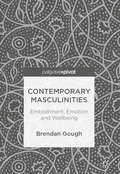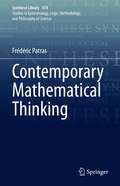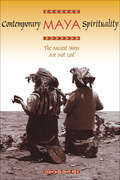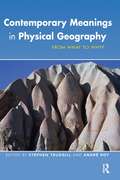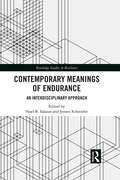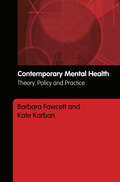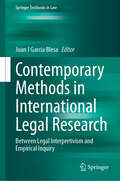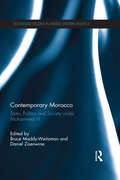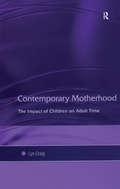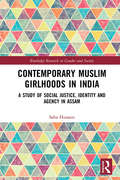- Table View
- List View
Contemporary Japanese Politics and Anxiety Over Governance (Politics in Asia)
by Ken'ichi IkedaThis book is an integrated examination of Japanese politics in the first two decades of the 21st century, as viewed from the perspective of "anxiety over governance."By empirically highlighting the social-environmental, political environmental, and sociocultural changes that have underlined the long-term political participation and voting behavior of Japanese citizens, the book provides deep insight into how modern democracies function and are perceived in post-industrial societies and reveals the specific processes by which Japanese politics have changed. Additionally, the book provides an analysis of the decline in social capital, the shrinking variety of political parties, and the intermingling of Asian values with liberal democratic values. By examining anxiety over governance, the chapters explore the links between anxiety and Japanese political behavior, revealing that, despite the high regard for democratic politics, Japanese citizens generally experienced a high level of anxiety and negative evaluation of the government, including countermeasures against COVID-19.Featuring surveys of Japanese political behavior over a period of more than 40 years, this book will be valuable reading for students and scholars of Japanese Politics, Political Behavior, and Psychology.The introduction, chapter 4 and chapter 5 of this book are freely available as a downloadable Open Access PDFs at http://www.taylorfrancis.com under a Creative Commons [Attribution-Non Commercial-No Derivatives (CC-BY-NC-ND)] 4.0 license.
Contemporary Jewish Philosophy: An Introduction (Routledge Jewish Studies Series)
by Irene KajonThis text introduces the most important Jewish philosophers of contemporary times from the point of view of their original approach to both Judaism and philosophy and include: Hermann Cohen, Franz Rosenweig, Martin Buber, Leo Strauss, Emmanuel Levinas. It shows how for them the dialogue between Judaism and philosophy is necessary in order to avoid on one side, an attachment to Jewish tradition which is only nationalistic or non-rational; and on the other, an idea of philosophy which first of all focuses the problems of nature, human existence in the world, or God as the origin of being. In reconstructing the intellectual evolution of each of these twentieth-century philosophers with a view to their meaning today, this book is unique and goes beyond the standard historical account provided by other books. Contemporary Jewish Philosophy is essential reading for researchers and students of philosophy, Judaism and the history of religions.
Contemporary Kazaks: Cultural and Social Perspectives
by Ingvar SvanbergThis is the first volume of field work, based on western ethnological standard, about the Kazakhs of Kazakhstan since Alfred E. Hudson's work published in 1938. Based on fieldwork conducted throughout the region, the various articles reflect the contemporary life of rural and urban Kazakhs. A common theme is the socio-cultural aspects of how their way of life has changed since independence.
Contemporary Kemalism: From Universal Secular-Humanism to Extreme Turkish Nationalism (Routledge Studies in Middle Eastern Politics)
by Toni AlarantaThe nature and content of Kemalist ideology in Turkey during the last twenty years is analysed in this book. In order to place the current manifestations of this Turkish official modernising ideology in the two-part context of globalisation and the re-sacralisation of the world, Contemporary Kemalism scrutinises the texts of five prominent Kemalist intellectuals. After defining the unquestioned ideological premises of Kemalism, such as its implied liberal philosophy of history, and its idea about human nature, the book describes Kemalism’s vision of the ideal society. Kemalism’s close relationship to social democracy and neo-nationalism is then discussed in detail. Also included is an analysis of contemporary Kemalism’s relation to earlier Kemalist articulations. The study demonstrates that various previous assumptions, both Western and Turkish, concerning Kemalism’s nature and content are too simplistic, and thus unable to account for the endurance of this ideology and its continuing relevancy in present-day Turkey. Inviting the reader to contemplate contemporary Kemalism’s ambiguous relationship with the Western world, this book will be of value to scholars and researchers with an interest in Middle Eastern Politics, Modernization Theory and Political Ideology.
Contemporary Korea-Southeast Asian Relations: Bilateral and Multilateral (Routledge Security in Asia Pacific Series)
by Lam Peng ErThis book presents a comprehensive overview of the relations between the two Koreas and the different ASEAN states, including their relations with ASEAN as an organisation. It outlines a complex picture with both bilateral and multilateral relations in play at the same time. It charts for each relationship how the present situation has arisen, discusses current difficulties and strains, and assesses how the relationship may develop in future.
Contemporary Korean Shamanism: From Ritual to Digital
by Liora SarfatiOnce viewed as an embarrassing superstition, the theatrical religious performances of Korean shamans—who communicate with the dead, divine the future, and become possessed—are going mainstream. Attitudes toward Korean shamanism are changing as shamanic traditions appear in staged rituals, museums, films, and television programs, as well as on the internet.Contemporary Korean Shamanism explores this vernacular religion and practice, which includes sensory rituals using laden altars, ecstatic dance, and animal sacrifice, within South Korea's hypertechnologized society, where over 200,000 shamans are listed in professional organizations. Liora Sarfati reveals how representations of shamanism in national, commercialized, and screen-mediated settings have transformed opinions of these religious practitioners and their rituals.Applying ethnography and folklore research, Contemporary Korean Shamanism maps this shift in perception about shamanism—from a sign of a backward, undeveloped Korea to a valuable, indigenous cultural asset.
Contemporary Latin American Cinema: Resisting Neoliberalism?
by Carolina Rocha Claudia SandbergContemporary Latin American Cinema investigates the ways in which neoliberal measures of privatization, de-regularization and austerity introduced in Latin America during the 1990s have impacted film production and film narratives. The collection examines the relationship between economic policies and the films that depict recent transformations in many Latin American countries, demonstrating how contemporary Latin American film has not only criticized and resisted, but also benefitted from neoliberal advancements. Based on films produced in Argentina, Bolivia, Brazil, Chile, Colombia, Ecuador, Mexico and Peru since 2010, the fourteen case studies illustrate neoliberalism’s effects, from big industries to small national cinemas. It also shows the new types of producers that have emerged, and the novel patterns of distribution, exhibition and consumption that shape and influence the Latin American filmscape. Through industry studies, reception analyses and close readings, this book establishes an informative and accessible text for scholars and students alike.
Contemporary Latina/o Media: Production, Circulation, Politics
by Arlene Dávila Yeidy M. RiveroThe cultural politics creating and consuming Latina/o mass media. Just ten years ago, discussions ofLatina/o media could be safely reduced to a handful of TV channels, dominatedby Univision and Telemundo. Today, dramatic changes in the global politicaleconomy have resulted in an unprecedented rise in major new media ventures forLatinos as everyone seems to want a piece of the Latina/o media market. Whilecurrent scholarship on Latina/o media have mostly revolved around importantissues of representation and stereotypes, this approach does not provide theentire story.In Contemporary Latina/o Media,Arlene Dávila and Yeidy M. Rivero bring together an impressive range of leadingscholars to move beyond analyses of media representations, going behind thescenes to explore issues of production, circulation, consumption, and politicaleconomy that affect Latina/o mass media. Working across the disciplines ofLatina/o media, cultural studies, and communication, the contributors examinehow Latinos are being affected both by the continued Latin Americanization ofgenres, products, and audiences, as well as by the whitewashing of “mainstream”Hollywood media where Latinos have been consistently bypassed. While focusingon Spanish-language television and radio, the essays also touch on the state ofLatinos in prime-time television and in digital and alternative media. Using atransnational approach, the volume as a whole explores the ownership,importation, and circulation of talent and content from Latin America, placingthe dynamics of the global political economy and cultural politics in theforeground of contemporary analysis of Latina/o media.
Contemporary Left Antisemitism
by David HirshToday’s antisemitism is difficult to recognize because it does not come dressed in a Nazi uniform and it does not openly proclaim its hatred or fear of Jews. This book looks at the kind of antisemitism which is tolerated or which goes unacknowledged in apparently democratic spaces: trade unions, churches, left-wing and liberal politics, social gatherings of the chattering classes and the seminars and journals of radical intellectuals. It analyses how criticism of Israel can mushroom into antisemitism and it looks at struggles over how antisemitism is defined. It focuses on ways in which those who raise the issue of antisemitism are often accused of doing so in bad faith in an attempt to silence or smear. Hostility to Israel has become a signifier of identity, connected to opposition to imperialism, neo-liberalism and global capitalism; the ‘community of the good’ takes on toxic ways of imagining most living Jewish people.
Contemporary Life and Witchcraft: Magic, Divination, and Religious Ritual in Europe
by Alexandra TātāranWitchcraft is very much alive in today's post-communist societies. Stemming from ancient rural traditions and influenced by modern New Age concepts, it has kept its function as a vibrant cultural code to combat the adversities of everyday life. Intricately linked to the Orthodox church and its rituals, the magic discourse serves as a recourse for those in distress, a mechanism to counter-balance misfortune and, sometimes, a powerful medium for acts of aggression.In this fascinating book, Alexandra Tataran skillfully re-contextualizes the vast and heterogenuous discourse on contemporary witchcraft. She shows how magic, divination, and religious rituals are adapted to the complex mechanisms of modern mentalities and urban living in the specific historical and social context of post-communist countries. Based on years of first-hand fieldwork, Tataran offers fascinating insights into the experience of individuals deeming themselves bewitched and argues that the practice can also teach us a lot about particular forms of adapting traditions and resorting to pre-existing cultural models.
Contemporary Literature and the End of the Novel: Creature, Affect, Form
by P. VermeulenThis book explores the paradoxical productivity of the idea of the end of the novel in contemporary fiction. It shows how this idea allows some of our most significant twenty-first century writers to re-imagine the ethics and politics of literature and to figure intractable forms of life and affect.
Contemporary Literature from Northeast India: Deathworlds, Terror and Survival (Routledge Contemporary South Asia Series)
by Amit R. BaishyaThe Northeast Indian borderlands, a cultural crossroads between South, Southeast and East Asia, constitute an important post-colonial exception to the narratives of nation, troubling the common perception of India as an ostensibly liberal regime. This book is the first to consider the representations of the effects of political terror and survival in contemporary literature from Northeast India. Fictions from this polyglot region offer alternative representations that show the post-colonial nation-state to engage in acts of aggression that parallel colonial regimes. The militarization of everyday life and the subsequent growth of cultures of impunity has left a lasting impact on ordinary existence in this border zone. Like in the much more widely discussed case of Kashmir, the governance of the Northeast region is not characterized so much by the management of life, the domain of what Michel Foucault calls biopolitics, but rather around the preponderance and distribution of death, what the postcolonial critic Achille Mbembe calls necropolitics. Not surprisingly, along with Mbembe’s theorizations, the influential works of the Italian philosopher, Giorgio Agamben, on 'bare life' have provided fruitful pathways to a study of the sovereign politics of death and political terror in this region. The author draws upon the conceptual literature on political terror and sovereign power through a reading of Anglophone fictions alongside Assamese fictional narratives (all published after 1990), but shifts the onus from the 'why' of violence to the 'how' of lived experience. An original study of contemporary survivalist fictions that explores survival under conditions of civil and military threat, this book is a valuable contribution to the field of contemporary global literature focusing on cartographies of death and sovereign terror and postcolonial literature.
Contemporary Lusophone African Film: Transnational Communities and Alternative Modernities (Remapping World Cinema)
by Paulo De Medeiros Livia ApaOffering a range of critical perspectives on a vibrant body of films, this collection of essays engages with questions specific to the various cinemas and films addressed while putting forward an argument for their inclusion in current debates on world cinema. The collection brings together 11 chapters by recognized scholars, who analyze a variety of films and videos from Angola, Cape Verde, Guiné-Bissau, and Mozambique. It also includes an interview with Pedro Pimenta, one of the most distinguished African film festival organizers. Drawing on various theoretical perspectives, the volume strives to reverse the relative invisibility that has afflicted these cinemas, arguing that most, if not all, Lusophone films are transnational in all aspects of production, acting, and reception. The initial three chapters sketch broad, comparative overviews and suggest theoretical approaches, while the ensuing chapters focus on specific case studies and discuss a number of key issues such as the convergence of film with politics, the question of gender and violence, as well as the revisiting of the period immediately following independence. Attention is given to fiction, documentary films and recent, short, alternative video productions that are overlooked by more traditional channels. The book stresses the need to pay attention to the significance of African film, and Lusophone African film in particular, within the developing field of world cinema. Bringing together general overviews, historical considerations, detailed case studies, and focused theoretical reflections, this book is a significant volume for students and researchers in film studies, especially African, Lusophone cultural studies, and world cinema.
Contemporary Marathi Cinema: Space, Marginality, and Aspiration
by Hrishikesh Sudhakar InglePost-millennial Marathi cinema is a dynamic and expanding practice that is celebrated as a “new-wave” but has not received much critical engagement. This book presents the first comprehensive inquiry of contemporary films and examines their textual, industrial, and cultural intersections to understand what constitutes the “new-ness” of Marathi cinema. Establishing the vernacular particularity of Marathi cinema, the book argues that newage films are actively engaged in a reflexive intellectual and social critique as a mark of new filmmaking in India. In the diversity of genres and topics handled by Marathi filmmakers since 2004 this study identifies four broad affective topographies for analysis – an imagery of nostalgia underpinning the narrative strategies of Marathi films, the articulation of social aspiration as a theme as well as a societal dialectic, an experiential reflexivity in the representation of Dalit and marginal narratives, and a mediatic network of border-crossings through transnational influences on films.Contemporary Marathi Cinema: Space, Marginality, and Aspiration offers a critical dialogue on broad issues of film policy, multiplex economics, genre forms, queer politics, and neoliberal contexts. It will be indispensable to students and researchers of Indian cinemas, regional filmmaking, media, cultural studies, popular culture and performance, literature, and South Asian studies, and will also be of interest to filmmakers and cinephiles.
Contemporary Masculinities in the UK and the US: Between Bodies and Systems (Global Masculinities)
by Stefan Horlacher Kevin FloydThis book is about ways to understand masculinity as systemic and corporeal, structural and performative all at once. It argues that the tension between an understanding of "masculinity" in the singular and "masculinities" in the plural poses a problem that can better be understood in relation to a concomitant tension: between systems on the one hand, and bodies on the other - between abstract structures such as patriarchy, kinship or even language, and the various concrete forms taken by gendered, individuated corporeality. The contributions collected here investigate how masculinities become apparent, how they take shape and what systemic functions they have. What, they ask, are the relations between the abstract and corporeal, metaphorical and metonymic manifestations of masculinity? How are we to understand masculinity as a simultaneously systemic and corporeal, performative concept?
Contemporary Masculinities: Embodiment, Emotion And Wellbeing
by Brendan GoughThis book assesses the construction of masculinities in relation to appearance, embodiment and emotions by drawing on perspectives in psychology, sociology, gender studies and public health. Brendan Gough questions conventional assumptions about masculinity and men’s health and responds to recent trends in critical studies of masculinities which discuss ‘positive’ or ‘healthy’ masculine identities. The book showcases discursively inflected qualitative research using data sources where men’s own accounts are prioritised: in-depth interviews and online discussion forums. Chapters discuss men’s appearance concerns and activities and examine male mental health, focusing on vulnerability and its management. Current trends and key concepts, including intersectionality, inequalities and embodiment are also considered throughout. This book will appeal to students and academics within social sciences and humanities interested in gender issues in general and masculinity in particular.
Contemporary Mathematical Thinking (Synthese Library #474)
by Frédéric PatrasThis book deals with the evolution of mathematical thought during the 20th century. Representing a unique point of view combining mathematics, philosophy and history on this issue, it presents an original analysis of key authors, for example Bourbaki, Grothendieck and Husserl. As a product of 19th and early 20th century science, a canon of knowledge or a scientific ideology, mathematical structuralism had to give way. The succession is difficult, still in progress, and uncertain. To understand contemporary mathematics, its progressive liberation from the slogans of "modern mathematics" and the paths that remain open today, it is first necessary to deconstruct the history of this long dominant current. Another conception of mathematical thought emerged in the work of mathematicians such as Hilbert or Weyl, which went beyond the narrow epistemological paths of science in the making. In this tradition, mathematical thought was accompanied by a philosophical requirement. Modernity teaches us to revive it. The book is intended for a varied public: mathematicians concerned with understanding their discipline, philosophers of science, and the erudite public curious about the progress of mathematics.
Contemporary Maya Spirituality: The Ancient Ways Are Not Lost
by Jean Molesky-PozSince the mid-1980s, when Guatemala returned to civilian rule and achieved relative peace and stability, the Maya have begun openly expressing their spiritual beliefs and practices. Jean Molesky-Poz draws on in-depth dialogues with Maya Ajq'ijab' (keepers of the ritual calendar), her own participant observation, and inter-disciplinary resources to offer a comprehensive, innovative, and well-grounded understanding of contemporary Maya spirituality and its theological underpinnings. She reveals significant continuities between contemporary and ancient Maya worldviews and spiritual practices. Molesky-Poz opens with a discussion of how the public emergence of Maya spirituality is situated within the religious political history of the Guatemalan highlands, particularly the recent pan-Maya movement. She investigates Maya cosmovision and its foundational principles, as expressed by Ajq'ijab'. At the heart of this work, Ajq'ijab' interpret their obligation, lives, and spiritual work. In subsequent chapters, Molesky-Poz explores aspects of Maya spirituality—sacred geography (the reciprocal relationship between the earth and humans, sacred places, and the significance of the cross or quatrefoil map), sacred time (how the 260-day sacred calendar is “the heart of the wisdom of the Maya,” the matrix of Maya culture), and ritual practice (the distinct way and method of ancestral study, with special attention to fire ceremonialism). She confirms contemporary Maya spirituality as a faith tradition with elaborate historical roots that has significance for individual, collective, and historical lives, reaffirming its own public space and legal right to be practiced.
Contemporary Meanings in Physical Geography: From What to Why?
by André Roy Stephen TrudgillOver the past twenty years, geography as an academic discipline has become more and more reflective, asking the key questions 'What are we doing?' 'Why are we doing it?'. These questions have, so far, been more enthusiastically taken up by human geography rather than physical geography. Contemporary Meanings in Physical Geography aims to redress the balance.Written and edited by a distinguished group of physical geographers, Contemporary Meanings in Physical Geography comprises of a collection of international writer's thoughts which reveal personal motivations, and look at tensions in the worlds of meaning in which physical geography is involved. How are the meanings of the physical environment derived? Is the future of physical geography one where the only, or at least the dominant, meanings are framed in the contexts of environmental issues.Covering a diverse and lively selection of topics, the contributors of this book offer guides to the contemporary debates in the philosophy of physical geography, and introduce the reader to its wider cultural significance. This book is an essential companion to anyone studying, or with an interest in, physical geography.
Contemporary Meanings of Endurance: An Interdisciplinary Approach (Routledge Studies in Resilience)
by Noel B. Salazar Jeroen ScheerderThis book critically analyses the concept of endurance from different theoretical, conceptual, methodological and empirical perspectives. The first part of the book takes a closer look at endurance, by examining how it relates to concepts such as resilience, perseverance, and perdurance. By analysing how these concepts overlap but differ, we reach a better understanding of what constitutes endurance. Furthermore, endurance is reconfigured as a as a mundane aspect of everyday life. The latter part of the book focuses on embodied experiences of endurance, more specifically on endurance running, walking, and (physical) performances. The different contributions focus on the meanings, values, and attributes that people ascribe to endurance in various socio-cultural contexts. The book uncovers practices, environments, and discourses in which endurance is applied and manifested, from drought-affected communities in rural Australia to professional endurance runners in Ethiopia, as well as migrants in Greece and performance acts in domestic spaces in the UK and beyond. This book will be of interest to scholars of movement sciences, sports studies, mobilities, leisure studies, and resilience studies.
Contemporary Mental Health: Theory, Policy and Practice
by Barbara Fawcett Kate KarbanThe authors explore theoretical developments and policy and practice initiatives in the complex and changing area of mental health services. They examine the tensions, dilemmas and opportunities now operating, including those relating to gender and ethnicity and places the involvement of users/survivors centre stage.Identifying and discussing the tensions between different professional models, varying ‘social’ perspectives and political imperatives, the book explores how these tensions are manifested in practice. Key topics include: the emphasis on risk as opposed to citizenship and entitlement social exclusion and inclusion professional and user perspectives the ‘territories’ of health and social care and their respective roles and relationships. An important theme running throughout is the critical appraisal of perspectives concerning gender, ethnicity and sexuality, drawing out wider issues of power and inequality. This book makes ideas and theoretical policy material accessible and applicable, and is a key text for students and practitioners in mental health, social work and social care.
Contemporary Methods in International Legal Research: Between Legal Interpretivism and Empirical Inquiry (Springer Textbooks in Law)
by Juan J Garcia BlesaThis book is a concise practical guide to some of the most relevant ways of thinking and doing international legal research today. It is designed to help students and early career researchers to get acquainted with the theory and practice of a selection of non-doctrinal modes of legal research that include feminist international law, critical international law and TWAIL, complemented with qualitative methods of empirical legal research. The book also encourages a meaningful dialogue with traditional doctrinal styles of legal research. The book’s most innovative aspect is its practical, learner-centred approach, which focuses on the applied learning of the modes of research presented.
Contemporary Morocco: State, Politics and Society under Mohammed VI (Routledge Studies in Middle Eastern Politics)
by Bruce Maddy-Weitzman Daniel ZisenwineDiscussions of the unsettled political and social landscapes in the Middle East and North Africa frequently point to Morocco as an exception. An Arab League member-state, Morocco enjoys a favorable image in the West, seemingly combining a healthy and balanced mix of tradition and modernity, authenticity with openness to foreign cultures, political stability and evolution towards greater pluralism, and a marked improvement in the legal and social status of women. This book offers a comprehensive and detailed scholarly examination of Morocco's political, social and cultural evolution under King Mohammed VI. Contributions from an international lineup of experts on Moroccan history, politics, economy, society and culture explain the tension and dynamics between the state authorities and competing social actors, and highlight the durability of the monarchical institution while also pointing to the continued challenges it faces from a variety of directions. The analysis touches on a number of issues, notably youth, and women and religious reform to investigate how the country has become significantly more open and less repressive, and how any unrest Morocco experienced during the recent ‘Arab Spring’ has been controlled. Employing various disciplines and theoretical perspectives, the result is an analytically rich portrayal which sheds important light on the country's prospects and the challenges it confronts in an era of steadily accelerating globalization. As such, it will be of interest to students and scholars who focus on modern Morocco, North Africa and the Middle East, as well as researchers in the fields of Comparative Politics and International Relations.
Contemporary Motherhood: The Impact of Children on Adult Time
by Lyn CraigIn this timely book Lyn Craig provides the first comprehensive account of how parents divide their time between caring for children, housework, paid work and leisure. Using large-scale quantitative time-use data , the book provides a detailed analysis of the impact of children upon adult time. This research reveals a unique picture of how parenthood affects daily life within households, and how people’s (paid and unpaid) workload is affected by parenthood. By looking at how the costs and benefits of children are currently conceptualized and apportioned, Contemporary Motherhood shows what becoming a mother entails and why it is so challenging to raise children. Suggesting an explanation for why fertility rates are dramatically dropping, the book makes a significant contribution to the debate on contemporary motherhood and will interest scholars and students in sociology and social policy with an interest in the sociology of the family, gender and sexuality, and the sociology of youth.
Contemporary Muslim Girlhoods in India: A Study of Social Justice, Identity and Agency in Assam (Routledge Research in Gender and Society)
by Saba HussainBased on empirical research in India, this book presents a post-colonial feminist analysis of subjectivities available to Muslim girls and the ways in which they are inhabited and negotiated. Examining government education policies together with the narratives of teachers and parents, the author explores the manner in which gender, class, ethnicity and religion intersect both to confer certain subjectivities and to challenge or reinforce the conferred subjectivities. A study of the imposition of subjectivities that label Muslim girls as economically subordinate and culturally different, Contemporary Muslim Girlhoods in India analyses Muslim girls’ reconstructions of self through a combination of reflexivity, resilience and agency, and conformity. Drawing on the thought of Pierre Bourdieu and Nancy Fraser, this volume offers an original contribution to the study of gendered minorities, institutions and relationships in post-colonial contexts, and an alternative to identitarian politics or cultural explanations of Muslim women’s educational deprivation in India. As such, it will appeal to scholars of sociology and gender studies with interests in education, class, religion and identity.
